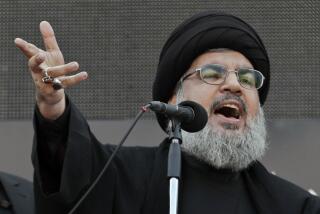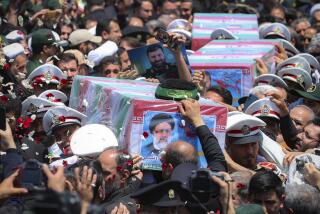Prime Minister Under Shah Is Slain in France
- Share via
PARIS — Shahpour Bakhtiar, the late Shah of Iran’s exiled prime minister and an outspoken foe of Tehran’s current government, and Bakhtiar’s secretary were found stabbed to death Thursday near Paris despite heavy security, the French Interior Ministry said.
There were no immediate claims of responsibility, but Iranian exiles blamed Tehran. Police said they were looking for three Iranians who had visited Bakhtiar on Wednesday night.
Bakhtiar, 76, was ousted and “sentenced to death” by the 1979 Muslim revolution that brought the Ayatollah Ruhollah Khomeini to power in Iran. In 1980, he escaped an assassination attempt by the pro-Iranian Hezbollah (Party of God) that claimed two lives.
The leader of the National Movement of the Iranian Resistance, he was the third Iranian dissident killed in France in less than a year.
Police bodyguards found the bodies of Bakhtiar and his aide Thursday morning at his home after Bakhtiar’s son, an inspector in French police intelligence, failed to reach his father on the telephone and raised the alarm, according to the Interior Ministry. The name of the aide was not released.
Bakhtiar’s plush, ivy-covered, red-tiled house, on a hill overlooking the River Seine in the quiet suburb of Suresnes, had been under permanent police protection. Friends questioned how the killers managed to gain access to the well-guarded exile. There were no signs of forced entry or struggle.
“It’s impossible for anyone to enter that house without being checked by the police guards. You can’t even get into the garage without being checked,” said Iraj Soltani, a Bakhtiar aide.
“It must have been someone he knew,” he added, weeping with rage.
Tearful Iranian dissidents carrying portraits of Bakhtiar gathered outside the house, cordoned off by police, and were quick to point an accusing finger at Tehran.
Police officers customarily stood sentry in two bulletproof posts at the front and back exits of Bakhtiar’s fenced property. The Bakhtiar family lived upstairs. At least two more police officers were assigned to patrol the ground floor, where supporters and fellow dissidents would meet.
Bakhtiar never left his house without a guard, and when he went for a drive, a police car led the way, neighbors said. Visitors left their identity papers at the entrance and were led up only after police checked that they had an appointment.
But aides claimed that security at the house was recently reduced. They also said France, improving its previously strained ties with Tehran, had put pressure on Bakhtiar to end his political activities in the last six months.
“France closed its eyes and let Iran kill Shahpour Bakhtiar,” charged Soltani.
Prominent exiles accused Tehran of putting out a death list of dissidents and sending a hit squad to France.
Former Iranian President Abolhassan Bani-Sadr, who lives in exile near Paris, told French radio he feels under threat.
Bakhtiar’s murder “was ordered by the mullahs” of Iran, Bani-Sadr charged.
“Three or four days ago, I received a list of oppositionists that the regime had decided to suppress . . . and among them was Shahpour Bakhtiar,” he said. “I received information saying that this time it was very serious, and that the mullahs in power had decided to suppress me (as well).”
“There is no doubt that this was committed by a death squad from the Khomeini regime,” said Afchine Alavi, secretary general of the People’s Moujahedeen, the main Iranian opposition group. Followers of the late Khomeini dominate the current government.
In Tehran, official radio made a simple report of Bakhtiar’s death, saying he had been killed in Paris.
The French government condemned the killings and promised a full investigation.
Bakhtiar served in office only 38 days before escaping to France when Shah Mohammed Reza Pahlavi was toppled by Shiite Muslim fundamentalists in February, 1979, and Khomeini was installed as the supreme leader.
In May, 1979, the Ayatollah Sadegh Khalkhali, an Iranian religious judge, declared he had “sentenced to death” Bakhtiar and 11 other top officials and relatives of the Shah who had fled Iran. The judge said he had sent hit squads abroad to hunt down the 12.
In the 1980 attempt on Bakhtiar’s life, armed men posing as journalists entered his house and tried to shoot their way to the former premier. They failed, but a police officer and a neighbor were killed and three police officers were wounded.
Anis Naccache, a Lebanese national and convicted leader of a pro-Iranian terror squad, was convicted of leading the five-member hit squad. But he was released from prison in 1990 in an swap involving French hostages in Lebanon.
In 1981, Bakhtiar founded the National Movement of the Iranian Resistance, an opposition-in-exile group opposed to the revolutionary government.
The former prime minister repeatedly denounced Khomeini and his political heirs. In 1989, he called Hashemi Rafansanjani, Iran’s president, “sinister . . . the most shady and corrupt mullah, and a man who is completely unbalanced.”
The same year, he criticized Khomeini’s edict condemning writer Salman Rushdie to death over his novel “The Satanic Verses,” saying, “No renegade has ever before dealt such a devastating blow to Islam as Khomeini did and continues to do.” He called the edict “shameful.”
This year, two other Iran dissident figures were assassinated in France.
Abdul Rahman Boroumand, 63, an aide to Bakhtiar, was stabbed to death in April outside his home about an hour after meeting with Bakhtiar, who latyer blamed Tehran for the assassination. Cyrus Elahi, a royalist, was assassinated in the city last October.
Other prominent Iranian dissidents were killed in other parts of Europe in 1989-90. They include Abdul Rahman Qassemlou, 59, secretary general of the Democratic Party of Kurdistan; Kazem Rajavi, 56, brother of Massoud Rajavi, leader of the People’s Moujahedeen group, and Bahman Javadi, 33, a leader of an exiled Communist group living in Sweden.
BACKGROUND
Shahpour Bakhtiar had been a marked man for more than 12 years. In May, 1979, Iranaian religious judge Sadegh Khalkhali declared that he had “sentenced to death” Bakhtiar and 11 other top officials of the Shah of Iran, adding that he had sent hit squads abroad to hunt them down. Within a year, Bakhtiar survived an attempt on his life in Paris. Significantly, Tehran threw its full diplomatic weight behind Anis Naccache, the Lebanese gunman who killed a policeman and a bystander in the attempt on Bakhtiar, winning his release from a life sentence after serving only 10 years in a French prison.
More to Read
Sign up for Essential California
The most important California stories and recommendations in your inbox every morning.
You may occasionally receive promotional content from the Los Angeles Times.













